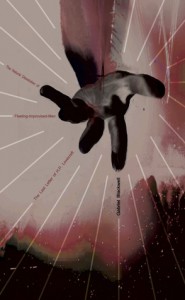An Interview with Gabriel Blackwell
I interviewed Gabriel Blackwell this weekend. We talked about his new book, The Natural Dissolution of Fleeting-Improvised-Men: The Last Letter of H.P. Lovecraft, which is a strange, scary, and above all absorbing novel about the final days of said author of the weird. We talked about our experiences with Lovecraft and Lovecraft fanfiction, Mexican men’s shelters, why we don’t like House of Leaves, and writing “objectively,” among other things. Please watch and enjoy. Then buy his books.
Video Review of The Natural Dissolution of Fleeting Improvised Men by Gabriel Blackwell
Trays of live worms for consumption, a nightly stroll with the shells of dead animals, and an arm covered in yogurt and soy sauce that smelled like strawberry grease for a whole afternoon; these are the ingredients for this new video book review of Gabriel Blackwell’s book by Gabriel Blackwell and meta-Gabriel Blackwell from CCM. I don’t know which of them is real. I think I’ve been hypnotized by Joseph Michael Owens’ music tracks. But I didn’t make this video. My wife did. She says she’s never seen any of the footage included and doesn’t understand why I’m crediting her. I don’t like strawberry soy sauce covering my arm so that my hands are unctuously melting into my chest. I’ve never eaten living worms before. I need to go back to America and have cheeseburgers made of artificial cheese and meat so I can have a culinary epiphany and shit out truths inspired by film cuts of scatological epics. You should read The Natural Dissolution of Fleeting-Improvised Men from CCM by Gabriel Blackwell reviewed by Peter Tieryas Liu and Angela Xu with music from Joseph Michael Owens and edited by Janice Lee.
(Read the previous review on HTMLGIANT here)
November 7th, 2013 / 11:49 am
The Natural Dissolution of Fleeting-Improvised Men by Gabriel Blackwell
 The Natural Dissolution of Fleeting-Improvised Men
The Natural Dissolution of Fleeting-Improvised Men
by Gabriel Blackwell
Civil Coping Mechanisms, Available October 2013
Gabriel Blackwell channels H.P. Lovecraft in The Natural Dissolution of Fleeting-Improvised Men, an epistolary metafiction that serves as part of a trilogy of works connected by his earlier Shadow Man and Critique of Pure Reason. In the introduction, Blackwell reveals that he has set out to Providence, Rhode Island, to find his girlfriend, Jessica, who disappeared while he was finishing the writing of Shadow Man. During that trek to Providence, he discovers the final letter of H.P. Lovecraft and that last message comprises most of the book in a footnoted poioumena intertwining his own desperate search with Lovecraft’s pestilential descent into madness. This isn’t just a pastiche of Lovecraft though, who died of intestinal cancer and whose last years were the most painfully productive. The mystery takes on a bizarre twist when he discovers the letter is addressed to another Gabriel Blackwell. Horror gets deconstructed and Lovecraft is retrofitted in a work that is less concerned with categorization than the ‘dissolution’ of existence. Experience itself becomes suspect as does the scholarship of pain. Blackwell, the meta character in the book versus the actual author, is typing out Lovecraft’s final letter. But as he does so, he is faced with a troubling revelation:
“That is, coming to the end of the particular sentence I was typing, I would look back over its analogue in the letter and would be unable to find even a third of what I had typed… This was undoubtedly made worse by the thicket of Lovecraft’s characters, by their lack of line breaks and paragraph breaks and even space between words, but it was also a quality of the prose. The events I was transcribing had not only not happened in life but not happened in the letter, either.”
It’s a setup for a mystery, a noir doused in elements of phantasmagoria with a magical lantern projecting Blackwell’s prose. The events described within are as gruesome and macabre as a Lovecraft story and in fact could be mistaken for one of his short stories. Horrible things are happening to the people in Lovecraft’s vicinity as in “this disgusting pile” that “was the remains of a man after he had been devoured and regurgitated by some horrid fungus or slime mold!” The grippe in his belly is devouring him from within and his mental state is corrupted into a decay and darkness that overwhelms his vision as much as his being:
“This thing in the basement was some sort of central node, a convergence of nerves. It was dowered with dark properties and obedient to dark laws; darkness was its element as air is the cloud’s, as water is the sea’s- the clashing, gnashing plates of its existence, in all of their horrifying splendor, were not so much dark as in aspect as of the dark…”
What adds a twist and requires a philological scalpel are the footnotes Blackwell uses to annotate his transcription of the letter. Much of the notes involves further elaboration of the plot details he outlines in his introduction. But there are disturbing intimations that require deciphering, a linguistic sonar to extrapolate from the echoes of meta-Blackwell’s journey. As his pursuit of Jessica becomes more desperate, his physical plight degenerates in a downward progression similar to Lovecraft’s. He is starving, cold, and suffering anemia. His body gets soaked with ink to the point where he does not recognize himself. With his impoverishment, things only get worse:
“I had a chronic inflammation around my anus- it itched all of the time and stung like a cut doused with hydrogen peroxide when wetted. I worried that I had soiled myself because of the wetness there, but always it was only blood.”
August 12th, 2013 / 11:00 am
